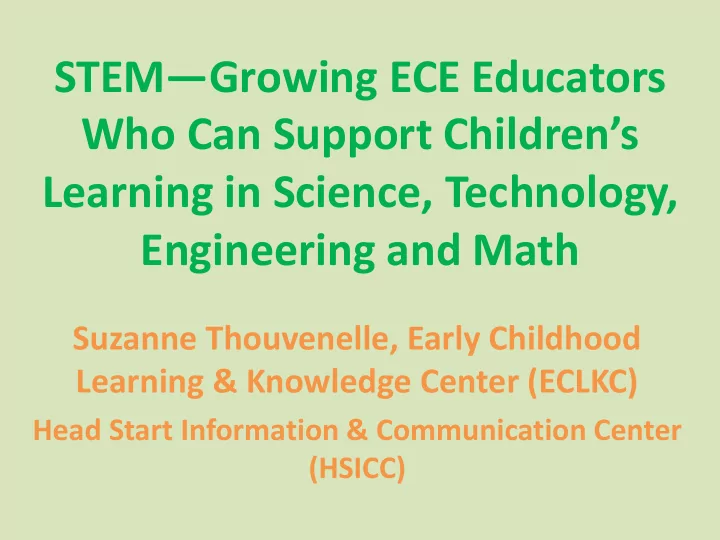

STEM — Growing ECE Educators Who Can Support Children’s Learning in Science, Technology, Engineering and Math Suzanne Thouvenelle, Early Childhood Learning & Knowledge Center (ECLKC) Head Start Information & Communication Center (HSICC)
#1 Poll
Webinar Focus : What’s in it for Me? Take-Aways — • STEM messages – what is STEM and why STEM skills are so important in ECE now and in our future; • current research about quality ECE science and math experiences in preschool classrooms; • how STEM domains promote children’s school readiness outcomes; • effective ways to use the natural world to support children’s learning and development in Science, Math and other domains; • key Science process skills of observing, predicting, investigating, classifying, and communicating, which are the basis of critical thinking and learning for children; • web-accessible resources for staff development that scaffold EC educators to build Science and Math competencies (absolutely over 100 free resources); and • strategies that teaching staff can use to promote parent/family engagement that is critical to improving the home environment’s learning supports.
How does the natural world connect with ECE Hot Topics ? Current Research and Trends SR — STEM — NBLD — Take a minute to think about these acronyms and what they mean. How would you define these terms or concepts?
#2 Poll
How does the outdoor environment connect with these ECE Hot Topics ? Current Research and Trends SR — School Readiness STEM — Science, Technology, Engineering & Mathematics NBLD — Nature Based Learning & Development
#3 Poll
1/3 of Americans would rather clean a toilet than do a math problem — what promise does that hold for us? Is it possible that STEM is central to successful school readiness outcomes for young children? Let’s closely look at the topics included in STEM, and how outdoor environments might relate to children’s success in school and In life.
What do we know about STEM and our Future? By 2030 when today’s preschoolers will be looking for work — how many STEM jobs will be available? What can EC Educators do to more effectively address STEM concepts?
What Does the Research Say?
Children Learn Using All the Science Process Skills
What’s Keeping Teachers from Quality Math and Science in EC Environments? • Lack of comfort and uncertainty • Lack of time • Lack of resources
So What Can We Do About ? Build teachers’ competencies in four areas: • Planning and implementing learning experiences that advance the intellectual development of children; • Creating learning environments that inspire children to ask questions; • Becoming more aware of children’s questions and responding in ways that challenge their thinking further; and • Encouraging and supporting the involvement of families in their children’s learning experiences.
Old Words, New Again • Mathematize — draw out and call attention to math content and processes in children’s experiences; first known use of mathematize — 1908 • Scientize Definition: to treat with a scientific approach – -the attempt to scientize reality, to name it and classify it; first Known Use of scientize — 1890
State Early Learning Standards Are the Foundation for Designing Intentional Experiences
Looking Inside STEM Let’s Begin with Science Where’s the Science?
Science-Centered Approach
Children’s Time Exploring the Natural World is the Perfect Launch for STEM Experiences
Stop & Think… Scientize & Mathematize How many learning and development opportunities do we have in the outdoor environment that intentionally support STEM and school readiness? How many could we have?
5 Domain elements number concepts & quantities The number relationships & operations geometry and spatial sense patterns Cognition & measurement and comparison General Knowledge includes Math and Science Do you see others?
Orders objects Creates patterns by size Knowledge of the Natural World – explores water Science – Compares Objects Gathers, sorts and classifies objects Observe and describe natural materials
Domain: Social & Emotional Development
Domain: Physical Dev & Health Example – Develops motor Example – Understands control and balance movement concepts Example – Develops motor Example – Develops strength coordination & skill and dexterity
Where do you see opportunities for STEM experiences in these outdoor environments?
OHS Discovering Science Series Webcasts Let’s do Science? Webcast #1 Science through Language and Literacy-- Look What I Know. See What Webcast #3 I Can Do! Webcast #2 Bringing It All Together in Effective Environments Webcast--#4
1 2 3 4
Teacher’s Guide to the Discovering Science Webcast Series
Marvelous Explorations of Science through Stories (MESS)
Only a Minute About the M in STEM Research Review of Children’s Early Math Competencies ECLKC Staff Development Math Resources Resources for Parents/Families
Math Webcasts an Related Resources Six Math Webcasts intended for personnel who support ECE classroom teaching teams: supervisors, directors, curriculum specialists, mentor-coaches, and T/TA staff. An additional set of 32-video-based lessons for self-study for teachers individually or in teams.
ECLKC Resources for Parents/Families Help children learn math during everyday-- I ncl routines. Parents can mathematize home experiences including when children are dressing, setting the table, eating a meal, or picking up toys. More options to connect math for children can happen while at the grocery store or in the park. Share free ECLKC Math and Science resources with parents and families to extend children’s learning to the home.
#4 Poll
Early Childhood Learning & Knowledge Center http://eclkc.ohs.acf.hhs.gov/hslc
Share your Take Aways about STEM and the Natural World AND Stay Connected with Us Find us on Twitter: @HeadStartgov twitter.com/HeadStartgov Find us on Facebook: facebook.com/HeadStartgov
Suzanne’s contact information: SuzanneT@hsicc.org
Recommend
More recommend